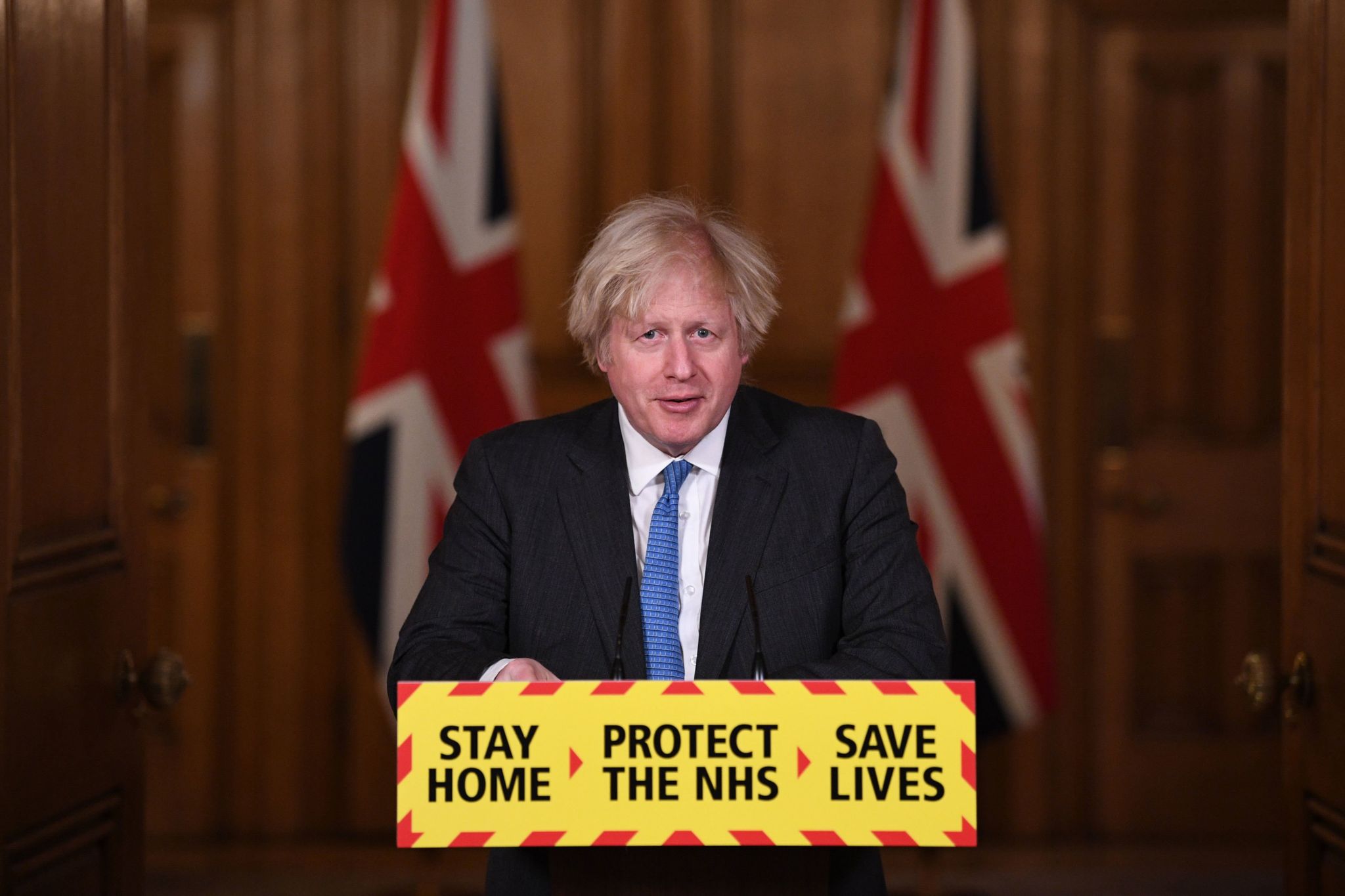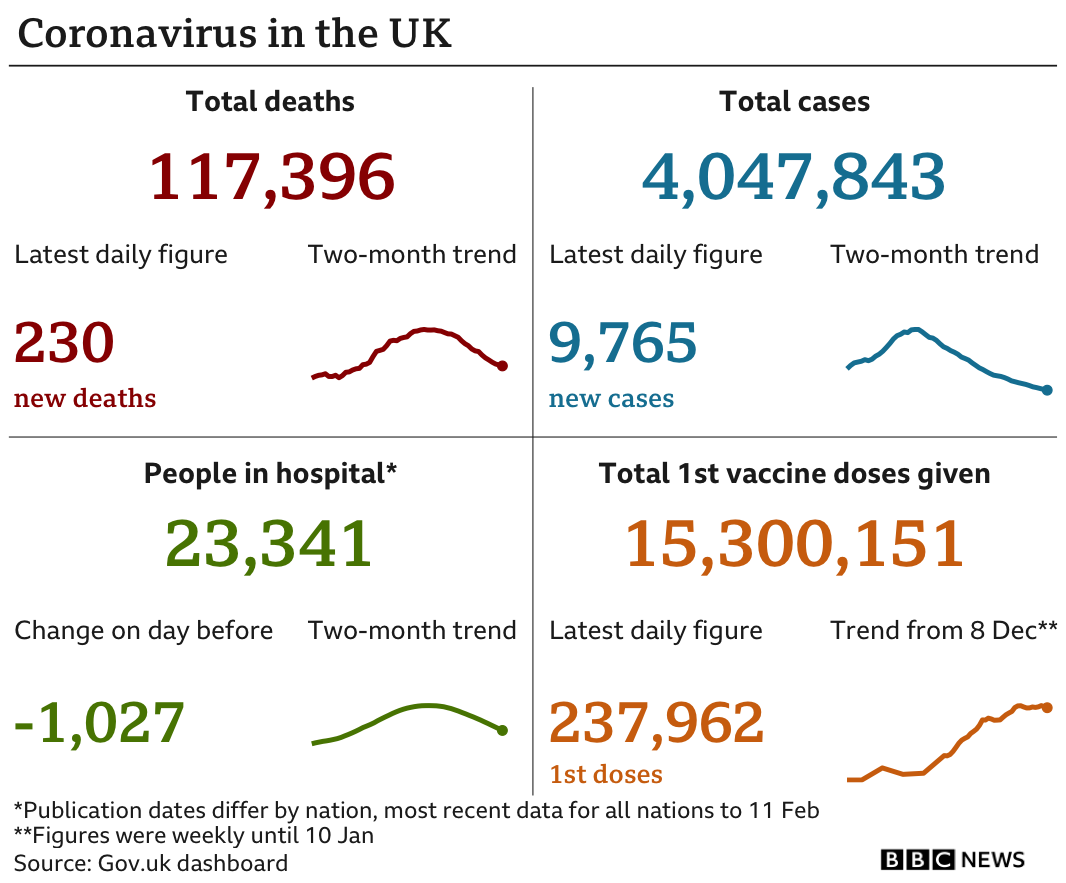
People must be "optimistic but patient" about the coronavirus situation in the UK and the end to restrictions, Boris Johnson has said.
The PM hailed the vaccine rollout, but warned that now was not the time to "relax".
He said there were still more people in hospital than at the peak of the first wave, and steps taken to ease lockdown should be "cautious but irreversible".
He is to set out a roadmap next week for lifting England's restrictions.
It comes after No 10 said it had hit its target to offer a jab to the UK's 15 million most vulnerable people.
Speaking at Monday's Downing Street briefing, Mr Johnson hailed the "unprecedented national achievement" of hitting the target to offer a vaccine to everyone in the top four priority groups, but warned the threat from the virus remained "very real".
The prime minister warned that the government did not have all the "hard facts" about how the vaccine impacted infections and that there were still more people in hospital with Covid-19 than in April - with admissions running at 1,600 a day across the UK.
"We have to keep our foot to the floor," he said.
Mr Johnson said no decisions were being taken ahead of the unveiling of his roadmap out of England's restrictions, but said the government wanted this lockdown "to be the last", with "cautious but irreversible" progress.
He added that although he was "increasingly optimistic" he could not give "an absolute cast-iron guarantee that we won't face further difficulties".
"I don't want people to think I'm not optimistic. There's been a big change - science is now in the ascendency over the disease," he added.


Could this be the last lockdown?
That is, of course, a huge shared hope and the government's stated aim.
It will soon be exactly a year since the first lockdown was brought in.
Who knew then that we'd be in a third period of national restrictions 12 months later?
Boris Johnson has been accused, at times, of over-promising and under-delivering during this crisis.
Today, again, he's urging caution - even as case rates fall and the vaccine rollout goes well.
That's because ministers really don't want to lift restrictions only to reimpose them again on a weary nation.

It comes after more than 60 Conservative MPs wrote to Mr Johnson over the weekend, calling for a commitment to a "free life" and ending of lockdown measures before May.
Steve Baker, the deputy chair of the lockdown-sceptic Covid Research Group (CRG) of Tory MPs leading the call, said schools should return on 8 March, hospitality should reopen by Easter and all other elements should be back to normal by 1 May - when all people in the top nine priority groups have been offered a vaccine.
Earlier, No 10 said the intention was to "start getting" pupils back into school on 8 March, but was not ruling out the possibility that they could be sent back in stages.
The PM's official spokesman said it was "important" the planned review of restrictions was carried out this week, with details to be set out in Mr Johnson's road map on Monday.
The spokesman added that he would not "pre-empt" what the road map might contain, but added: "it remains our priority to get kids back to school and we always said we want that to start from 8 March, if the science and evidence allows".

- LOCKDOWN RULES: What are they and when will they end?
- SCHOOLS: When will they reopen?
- VACCINE: When will I get the jab?
- NEW VARIANTS: How worried should we be?

The government is hoping to offer a jab to everyone in the first nine priority groups - including everyone over the age of 50 - by the end of April, Mr Johnson said.
This would run alongside giving second doses within the 12-week window to those in the top four priority groups, who have already had a first dose.
All those aged between 16 and 64 with underlying health conditions, as well as adult carers, are being contacted with the offer of a vaccination.


With every day that passes, it becomes clearer and clearer that the UK is winning its fight against Covid.
Science, as Boris Johnson said, is in the ascendancy.
It is easy to forget this virus only emerged just over a year ago.
But now the UK has approved three vaccines for use - two of which have already started to be rolled out at speed. Another two are being assessed by the regulator after promising trial results.
There is confidence the mutations, while presenting a challenge, can be overcome. Plans are already being made to update the vaccines if needed to work better against new variants.
No vaccine is 100% effective and some people may choose not to take it. That's why advances in treatment are vital, too.
A cheap steroid, dexamethasone, is being widely used to improve the survival rates of the sickest patients. And last week it emerged an arthritis drug, tocilizumab, could also further improve survival chances.
There is still a long way to go, but there is a cautious belief in both Westminster and among scientists that each step made from now on should be forward not back.

Speaking at the same Downing Street briefing, NHS England's chief executive Sir Simon Stevens described the vaccine rollout as "two sprints and a marathon".
He said the UK had passed the "finishing line of the first sprint, and now we've got a second sprint between now and 30 April to extend the number of vaccinations given to the higher risk groups of the population, before then moving on to the marathon, which will be vaccination for everybody in the country who is eligible" alongside the winter flu campaign and further booster shots if needed.
On Monday, the UK recorded another 9,765 new coronavirus infections, according to the latest government figures. It is the first time the daily cases figure has been under 10,000 since 2 October.
A further 230 deaths within 28 days of a positive test were also recorded. Fewer deaths tend to be reported on Mondays due to a reporting lag over the weekend.

In other developments:
- A third of social care staff in England have not had a Covid vaccine, Health Secretary Matt Hancock has said, despite them being among the groups prioritised
- The first travellers required to stay at government-provided quarantine hotels under tougher border rules have begun arriving in the UK
- Research by a team at the University of Warwick suggests that schools do not appear to play a big role in spreading coronavirus in the community

- DOWNTIME SYMPHONY: An hour of wind-down music to help you press pause and reset your mind
- ARE PEOPLE BORN EVIL?: Learn new things with Greg James and Bella Mackie from Britain's most inspiring teachers

https://news.google.com/__i/rss/rd/articles/CBMiJmh0dHBzOi8vd3d3LmJiYy5jby51ay9uZXdzL3VrLTU2MDc1ODMy0gEqaHR0cHM6Ly93d3cuYmJjLmNvLnVrL25ld3MvYW1wL3VrLTU2MDc1ODMy?oc=5
2021-02-15 19:35:00Z
52781366716199
Tidak ada komentar:
Posting Komentar